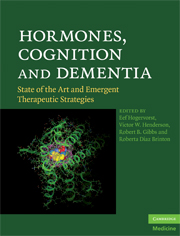Book contents
- Hormones, Cognition and Dementia
- Hormones, Cognition and Dementia
- Copyright page
- Contents
- Contributors
- Preface
- Section 1 Estrogens and cognition: perspectives and opportunities in the wake of the Women's Health Initiative Memory Study
- Section 2 Varieties of estrogenic therapy
- Section 3 Potential modulators and modifiers of estrogenic effects
- Section 4 Possible genetic factors related to hormone treatment effects
- Section 5 Testosterone, estradiol and men, and sex hormone binding globulin
- Section 6 Gonadotropin effects
- Index
- Plate Section
Section 1 - Estrogens and cognition: perspectives and opportunities in the wake of the Women's Health Initiative Memory Study
Published online by Cambridge University Press: 06 July 2010
- Hormones, Cognition and Dementia
- Hormones, Cognition and Dementia
- Copyright page
- Contents
- Contributors
- Preface
- Section 1 Estrogens and cognition: perspectives and opportunities in the wake of the Women's Health Initiative Memory Study
- Section 2 Varieties of estrogenic therapy
- Section 3 Potential modulators and modifiers of estrogenic effects
- Section 4 Possible genetic factors related to hormone treatment effects
- Section 5 Testosterone, estradiol and men, and sex hormone binding globulin
- Section 6 Gonadotropin effects
- Index
- Plate Section
Summary
The landmark Women's Health Initiative Memory Study (WHIMS) program has had an enormous impact on our understanding of how estrogens and estrogen-containing hormone therapy affect cognitive outcomes in postmenopausal women. It is the starting point and touchstone for any discussion on cognition and dementia in women. As reviewed in this chapter by principal WHIMS program investigators, the WHIMS comprised two large randomized placebo-controlled trials of conjugated equine estrogens with and without medroxyprogesterone acetate in women aged 65 years and older. In this study, the two hormone therapy formulations were associated with increased risk for probable dementia (hazard ratio 1.77, 95% confidence interval 1.22 to 2.58). They were also associated with a small adverse mean difference of 0.21 (0.06 to 0.37) points on the 100-point Modified Mini-Mental State examination. Adverse findings were similar for both hormone therapy formulations and for women with and without histories of prior hormone therapy use. The Women's Health Initiative Study of Cognitive Aging and the Women's Health Initiative Magnetic Resonance Imaging Study were conducted on subsets of WHIMS participants. The former found little evidence that conjugated equine estrogens with medroxyprogesterone acetate had a positive effect on cognitive aging. The latter found that the hormone therapy formulations were associated with decreased brain volumes, particularly among women with lower levels of cognitive function at baseline, but mean effects on ischemic lesions were not significant. No subgroups of WHIMS participants have been identified for which initiating hormone therapy appears to convey cognitive benefit.
- Type
- Chapter
- Information
- Hormones, Cognition and DementiaState of the Art and Emergent Therapeutic Strategies, pp. 1 - 64Publisher: Cambridge University PressPrint publication year: 2009
- 1
- Cited by



